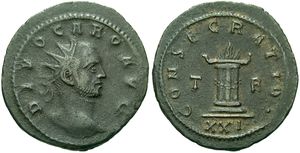Carus
| Carus | |
|---|---|
| Emperor of the Roman Empire | |
 |
|
| Carus on a posthumous coin. | |
| Reign | 282–283 |
| Full name | Marcus Aurelius Carus (from birth to accession); Caesar Marcus Aurelius Carus Augustus (as emperor) |
| Born | c. 230 |
| Birthplace | Narbo |
| Died | late July/early August 283 (aged 53) |
| Place of death | Beyond the River Tigris |
| Predecessor | Probus |
| Successor | Carinus |
| Offspring | Carinus, Numerian, Aurelia Paulina |
Marcus Aurelius Carus (c. 230 – late July/early August, 283) was a Roman Emperor (282–283). During his short reign, Carus fought the Germanic tribes and Sarmatians along the Danube with success. During his campaign against the Sassanid Empire he sacked their capitol Ctesiphon, but died shortly thereafter. He was succeeded by his sons Carinus and Numerian; creating a dynasty which, though shortlived, granted further stability to a resurgent empire.
Contents |
Biography
Carus, whose name before the accession may have been Marcus Numerius Carus, was born, probably, at Narbo (modern Narbonne) in Gaul,[1] but was educated at Rome. He was a senator, and had filled various civil and military posts before he was appointed prefect of the Praetorian Guard by the emperor Probus in 282. After the murder of Probus at Sirmium, Carus was proclaimed emperor by the soldiers. Although Carus severely avenged the death of Probus, he was himself suspected of having been an accessory to the deed. He does not seem to have returned to Rome after his accession, but contented himself with an announcement of the fact to the Senate.
Bestowing the title of Caesar upon his sons Carinus and Numerian, he left Carinus in charge of the western portion of the empire, and took Numerian with him on the expedition against the Persians which had been contemplated by Probus. Having defeated the Quadi and Sarmatians on the Danube, Carus proceeded through Thrace and Asia Minor, annexed Mesopotamia, pressed on to Seleucia and Ctesiphon, and carried his arms beyond the Tigris. The Sassanid Emperor Bahram II limited by internal opposition, could not effectively defend his territory. For his victories, which avenged all the previous defeats suffered by the Romans against the Sassanids, Carus received the title of Persicus Maximus.
Carus' hopes of further conquest were cut short by his death. One day, after a violent storm, it was announced that he was dead. His death was variously attributed to disease, the effects of lightning, or a wound received in a campaign against the Persians. The facts that he was leading a victorious campaign, and that his son Numerian succeeded him without opposition, suggest that his death may have been due to natural causes.
References
Primary Sources
- Aurelius Victor, Epitome de Caesaribus
- Eutropius, Breviarium ab urbe condita
- Historia Augusta, Life of Carus, Carinus and Numerian
- Joannes Zonaras, Compendium of History extract: Zonaras: Alexander Severus to Diocletian: 222–284
Secondary Sources
 This article incorporates text from a publication now in the public domain: Chisholm, Hugh, ed (1911). Encyclopædia Britannica (Eleventh ed.). Cambridge University Press.
This article incorporates text from a publication now in the public domain: Chisholm, Hugh, ed (1911). Encyclopædia Britannica (Eleventh ed.). Cambridge University Press.- Leadbetter, William, "Carus (282–283 A.D.)", DIR
See also
Notes
- ↑ The tradition that he was one of the so-called "Illyrian Emperors", based on the unreliable vita Cari embedded in the Augustan History, was accepted uncritically by Joseph Scaliger, who assumed the other sources were wrong, and followed by Edward Gibbon in The Decline and Fall of the Roman Empire. (Tom B. Jones, "A Note on Marcus Aurelius Carus" Classical Philology 37.2 (April 1942), pp. 193–194).
| Regnal titles | ||
|---|---|---|
| Preceded by Probus |
Roman Emperor 282–283 |
Succeeded by Carinus and Numerian |
| Political offices | ||
| Preceded by Probus , Victorinus |
Consul of the Roman Empire 283 with Carinus |
Succeeded by Carinus, Numerian |
|
|||||||||||||||||||||||